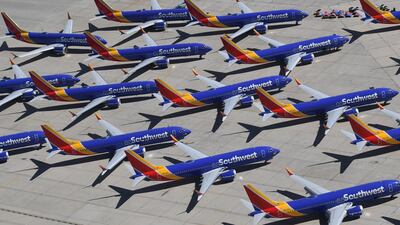The head of a global airline lobby group said he hopes a gathering of the US aviation regulator and its global peers in Montreal this week will lead to "better alignment" on the conditions and timeline for returning Boeing's grounded 737 Max to the skies.
Alexandre de Juniac, director-general of the International Air Transport Association, warned that a fragmented approach by the regulators may lead to "mistrust" in the existing jet certification process.
"I hope [the meeting] will lead to a better alignment, even if the FAA said each country will make its own decision," Mr de Juniac told reporters on a conference call on Tuesday. "We are permanently in favour of alignment among regulators, alignment on conditions, alignment on schedule for the re-entry into service of this aircraft."
The comments come amid a meeting of the International Civil Aviation Organisation (ICAO), an arm of the United Nations, in Montreal. IATA has repeatedly voiced concerns over the rift between global regulators on the measures needed to return the 737 Max to service after two deadly crashes.
"If there’s misalignment, you can have a situation where it can fly in some airspace and not in the neighbouring airspace," Mr de Juniac said.
A lack of coordination among air-safety regulators with different standards for its flight "will not improve the trust of the general public in the system", he said.
Airlines have urged regulators to better co-ordinate on the safety requirements and schedule to return the Max to service and assess the software changes Boeing has undertaken on the jet.
A single-certification process for new aircraft has been a success in the industry for decades and the elimination of such a system would be "a big problem", de Juniac said.
"People will legitimately ask why do you want training sessions on this part of the world and iPad sessions on the other part of the world?” the executive said.
Some countries such as the UAE, Canada, Brazil and China have said they will conduct their own independent safety checks on the aircraft before restoring flights.
The executive stopped short of saying that pilot training should be uniform around the world, amid concerns about how pilots can cope with the increasing complexity of new planes.
"I'm not sure its necessary to have exactly the same training scheme everywhere," he said. "It would be a good question to be discussed in ICAO."
The Max has been grounded for six months, forcing airlines to cancel or reduce flights but the FAA reiterated it has no set time to return the Max to the skies.
"The real point is to restore mutual trust among regulators and alignment to ensure the single-certification system works properly, as it has in [the] last 50 years," Mr de Juniac said.
The executive also said the aviation industry has made major strides in reducing its carbon footprint, amid protests to reduce flying due to carbon emissions.
"It's possible to fly and reduce our carbon footprint," he said. "Flying is not the enemy, the real enemy is carbon. We are committed to reduce our carbon footprint and to fight against this enemy."


